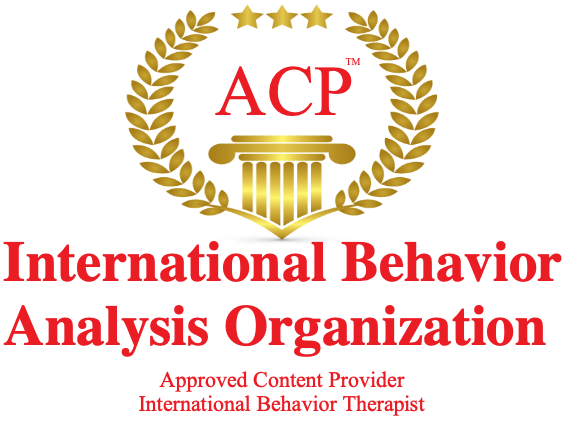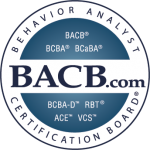ABA Therapy Training Course
For current and future professionals in psychology, education and therapy.



Next batch starting on
20 April 2026
In Person
Location: Joyin Children’s Studio at Tebet Timur, Jakarta
Start Date: 21 June 2025
Schedule: 1 meeting per week, every Saturday at 9.00 – 15.00 WIB [ENDED]
Duration: 5 hours per meeting, for 3 weeks
Language: Bahasa
Certificate of Completion: Issued upon completion
Location: Online
Start Date: 20 April 2026
Schedule: 1 meeting per week, every Monday at 16.00 WIB
Duration: 1 hours 30 minutes per meeting, for 10 meetings
Language: Bahasa
Certificate of Completion: Issued upon completion
Remote
Training Format
Joyin is accredited by HIMPSI and leading organizations in the field of ABA.



Our course meets international standards for ABA training and is designed to support certification and high-quality clinical practice worldwide.
Why Join Our ABA Therapist Training Course?
- If you’re looking for an effective therapeutic model to support children with autism…
- If you want to evolve your practice into a more integrative and relational approach…
- If you’re seeking a comprehensive method that creates real, lasting change…
- If you want to feel confident and competent in your professional role…
Then this course is for you!
Our ABA Therapist Training Course takes you from theory to practice, providing you with a strong scientific foundation and practical tools to understand, support, and meaningfully connect with children with autism.
Why Choose Our ABA Training Course?
Practical & Scientific
Learn to apply ABA immediately through engaging lessons, real-life demonstrations, and hands-on exercises.
Exclusive Learning Materials
Access resources designed to support the practical application of ABA in your professional or family setting.
Expert Instructors
Taught by our lead case managers with extensive, real-world experience in autism therapy.
Live Interactive Lessons
Participate in live sessions to deepen your understanding, ask questions, and connect directly with instructors and peers.
International Certification Path
Our training supports your journey toward internationally recognized credentials in ABA.
Certificate of Completion
Receive a certificate you can use to apply for therapist roles in both private practices and organizations.

“Over the past 25 years working in the autism field, my team and I have trained hundreds of professionals in ABA — both in Indonesia and internationally. This course brings together much of what I’ve learned, and what I truly believe makes a difference when working with children with autism.”
Luca Serventi, Psy, BCBA – Training Director
Our Approach to ABA Therapy
Our method combines the rigor of ABA with a deep understanding of development, relationships, and the real-world contexts where learning happens. Here’s what guides our practice:
Integrative
To be truly effective, ABA must integrate and collaborate with other disciplines — developmental psychology, speech-language pathology, biomedical intervention and more. Therapy should be pluralistic, comprehensive, and responsive to the complexity of each child’s needs.
Relational
Autism is not a cognitive deficit — and therapy is not simply teaching discrete skills. True therapy begins with building the relationships that support learning, communication, and emotional growth. As therapists, our most important commitment is in supporting the relational development of our clients.
Responsive
At the heart of therapy is the therapist’s ability to adapt and respond, moment by moment, to the child and the context. This real-time attunement creates the conditions for meaningful, transformative experiences. It is within the ongoing, moment-to-moment relationship between child and therapist that true change takes place.
Developmental
Effective ABA must be informed by a deep understanding of both typical and autistic developmental trajectories. How do children naturally acquire language? Why do children with autism struggle to initiate or sustain social engagement? Our approach starts by answering these questions, so we can support real developmental progress.
Naturalistic
Over five decades of ABA applied to autism has shown that meaningful, lasting change happens in natural environments. Real interactions, natural antecedents, and social reinforcement are far more powerful than drills or token-based systems.
Evolving
Since the early 2000s, the field of ABA has been shifting toward more naturalistic, developmental, and integrative practices. As professionals, we have a responsibility to stay current and continually refine our approach to best support each child’s growth.

Luca Serventi, Psy, BCBA
With over two decades of international experience, Luca brings deep clinical insight and a unique multicultural perspective to his work with children with autism. He studied Clinical Psychology at the University of Padua and specialized in Applied Behavior Analysis at Kent University (UK) and the Florida Institute of Technology (USA). Luca’s career spans three continents—Italy, the UK, and Indonesia—where he founded a nonprofit and later established Joyin – The Children’s Centre. His approach integrates developmental and relational methods within a behavioral framework, offering a comprehensive and child-centered model of autism therapy. Now based in Italy, Luca is building his third clinic, In Gioco, while continuing to serve as a key leader and contributor to Joyin’s mission and vision.
Course Designer
Your Trainer

Joice Limpo, M.Psi
A child psychologist who graduated from the University of Indonesia, Ms. Limpo has dedicated her career to working with children with autism and social communication disorders. With extensive experience in therapist training and supervision, Ms. Limpo combines her profound knowledge and practical skills to create an engaging and effective learning experience. Her commitment to improving therapeutic practices ensures that participants will gain invaluable insights and techniques, making this course an exceptional resource for professionals seeking to enhance their competence and impact in the field.

Sunia F. Azmi, M.Psi.T, RBT
As a Registered Behavior Technician (RBT) with a Master’s degree in Applied Psychology from the University of Indonesia, Ms. Sunia brings 8 years of experience in early intervention and child development. Her expertise in early intervention, autism, and behavior makes her an outstanding trainer in therapist onboarding. Through a structured, practical, and dedicated training approach, Ms. Sunia equips therapists with essential skills to deliver effective, high-quality interventions.
4,8 / 5

100% trainee satisfaction based on participants' feedback
Who is this course for?
This course is ideal for current therapists or those aspiring to be therapists, as well as professionals and specialists who wish to understand the principles and practice of effective therapy.
No formal academic prerequisites are required, but it is particularly suited for:
- Graduates in Psychology
- Graduates in Speech Therapy
- Graduates in Occupational Therapy
- Experienced Therapists
- Child Psychologists
- Pediatricians
What you'll learn?
Rethinking Autism and Related Developmental Disorder Diagnoses: Science, Myths, and Impact
- Understanding Developmental Disorders
- What are developmental disorders?
- How are they diagnosed?
- Medical vs. Psychiatric Diagnosis: Key Differences
- The Diagnostic Process:
- Diagnosis as a Process of Categorization
- Criteria Based on Expert Consensus
- Why Are Autism Rates Increasing?
- The Usefulness of Psychiatric Diagnoses
- Organizing Research
- Planning and Delivering Services
- Marketing and Advocacy
- Communication and Collaboration
- The Risks of Treating Labels as Diseases
- Circular Reasoning in Diagnosis
- Stigmatization and Self-Stigmatization
- The Labeling Effect:
- The Pseudopatient Experiment
- Self-Fulfilling Prophecy:
- The Pygmalion Effect
- Risks of Reductionism
- The Biopsychosocial Approach
- Pluralism and complexity
- The Role of Interpersonal Relationships in Therapy
Set The Foundation for Engagement and Learning
- Joint Engagement as pivotal behaviour: definition and function.
- Therapeutic strategies to increase child’s engagement:
- Environmental arrangements to reduce distractions
- Reciprocal positions to facilitate engagement
- The importance of child’s motivation
- Emotional Animation
- Responsive interaction style
- The role of Joint Action Routines (JARs) in child development
- Sensory Social Routines (SSRs)
- How to develop new SSRs
- How to facilitate child’s initiation and communication during SSRs
- Examples of SSRs
- Reactive strategies to child’s disengagement
- How to handle difficult behaviour
- Measuring child’s engagement and data collection
The Bases of Social Reciprocity and Joint Action
- Transactional Model of Development
- Importance of balanced interaction in child’s social and language development
- Strategies to develop Social Reciprocity:
- Turn-taking format
- Follow child’s lead
- Mirroring
- Extending
- Matching
- Activity ideas for developing social reciprocity
Facilitate Language Acquisition Through Modelling
- Importance of social interaction for phonetic learning
- Modelling
- Marking modelling
- Reflective modelling
- Characteristics of effective modelling strategy
- Common mistakes: Correcting & Instructing
- Modelling vs. Correcting
- Practical suggestion to run the modelling strategy
- Song-Gesture Routines (SGR)
- Activity ideas
Shape The Interaction Through Prompting and Reinforcement
- Shaping the mand
- Prelinguistic mand
- Linguistic forms of manding
- Practical suggestion for prompting mands
- Strategies and environmental arrangements to create opportunities for communication
- Inadequate portions
- Control access
- Offer choices
- Offer unwanted items
- Use items that require adult’s assistance
- Playful obstruction
- Balanced turns
- Put object in sight but out of reach
- Missing item
- Practical suggestions for program implementation
- Social sensory routines with objects
Create Opportunities for Communication
- Establishing behaviors for initiating joint attention
- Common form as IJA behavior
- Teaching IJA
- Establishing behaviors for responding to joint attention
- Common form as RJA behavior
- Teaching RJA
- Teaching activities to build joint attention
- Establishing the routines
- Shaping eye contact
- Shaping pointing
Learning Play Skill Through Imitation and Turn Taking
- Importance of play in child’s development
- The importance of imitation in child’s development
- Strategies to develop new play actions and play routines
- Demonstrating new action on toys
- Verbal markers
- Waiting
- Using prompt and prompt fading
- Developmental stages of play
- Indiscriminate play
- Discriminative play
- Combinatorial Play
- Pretend Play
- Self-centred symbolic play
- Decentred symbolic play
- Combinatorial pretend
- Using other as actor
- Substitutions
- Practical suggestions for program implementation
Parental Guidance Style and Daily Living Routines
- The impact of parental guidance style on child’s independence
- Zone of Proximal Development (ZPD)
- Impact on over-prompting on developing child’s independence
- Develop child’s independence skills during daily living routines:
- Transitions
- Meal & snack time
- Dressing & undressing
- Bathing
- Household Chore
Addressing Barriers To Child’s Development
- Medical conditions
- Daily schedules
- Eating Disorders
- Sleeping Disorders
- Digital Addiction
- Physical activity
Ethical Code for Behavioral and Developmental Therapists in Indonesia
- Responsible Conduct
- Responsibility to Clients
- Confidentiality
- Competence and Service Delivery
Contact Sales
Are you part of a centre, school or a hospital and wants to train your staff?
Please leave us your contact details so we can deliver a customized offer tailored to your company’s need. No commitment.
- Special price for more than 4 participants
- Tailored content to your area of interest and organizational needs
- Opportunity for hands-on coaching and curriculum development
Please note: This form is only for organizations (e.g. schools, clinics, hospitals) interested in group training for their staff.
If you are an individual looking to join the course, please click here to register.
